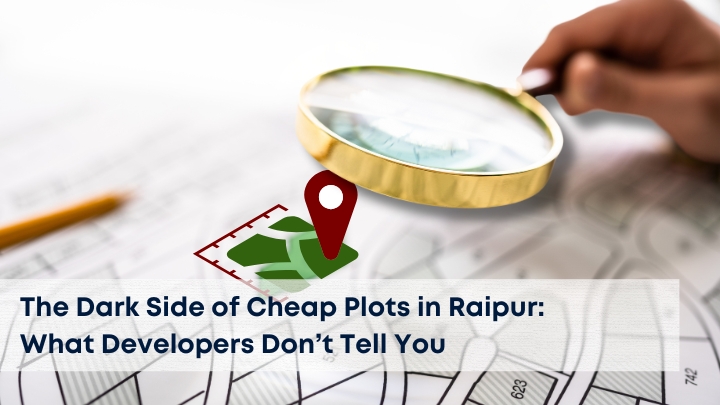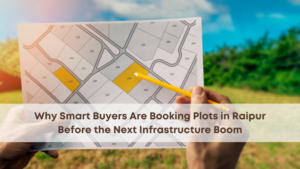“Low price, high returns!”
“Book your plot today before prices rise!”
You’ve probably seen ads like these all over to buy plots in Raipur . On hoardings, social media, and even WhatsApp forwards, everyone seems to have the “cheapest plot deal” in town.
But here’s a reality check: not all cheap plots are good deals. Many come with hidden issues that can turn your dream home into a long, stressful nightmare. Let’s take a friendly walk through what really happens behind the scenes when you go for a “too good to be true” property deal in Raipur.
1. The Hidden Cost Behind “Cheap”
When something is sold at a surprisingly low price, there’s always a reason. In real estate, cheap often means you’re paying less money now but much more later.
Some developers lower prices by skipping important approvals, using low-quality materials, or buying land that has legal complications. At first, you might feel like you’ve saved a lot, but eventually, you’ll spend years clearing disputes, fixing quality issues, or chasing paperwork.
It’s like buying a used car without checking the engine. It runs fine for a few weeks, then suddenly stops working — and all the money you “saved” vanishes in repairs.
2. Missing Legal Clearances
Legal clearance is the backbone of a safe property investment. Yet, many “cheap” plots are sold without proper RERA registration, layout approval, or title verification.
Some developers start selling land that hasn’t even been converted from agricultural to residential use. Others might have pending court cases or incomplete documentation.
If you buy such a property, the burden of proving its legality later falls on you. Banks may refuse to offer home loans, and government authorities can issue stop-work notices. That’s when you realize that a few thousand rupees saved upfront are nothing compared to the legal troubles ahead.
3. Poor Location Planning
Developers selling cheap plots often pick land in remote or underdeveloped areas. Sure, the brochure might say “just 15 minutes from the city,” but in reality, you might be 15 minutes away from the nearest streetlight.
Many of these locations lack basic amenities such as roads, drainage systems, or electricity. Some even fall outside municipal limits, which means you won’t get city water connections or garbage collection services.
Imagine moving into your new house only to find muddy roads during the monsoon and long drives for daily essentials. A lower cost might seem worth it now, but convenience, safety, and accessibility are priceless in the long run.
4. No Infrastructure, No Growth
In a well-planned township, developers invest in parks, security, paved roads, and community areas. Cheap plot sellers, however, usually skip all these facilities to reduce costs.
You may think, “I’ll build my own house anyway, why care about infrastructure?” But good infrastructure not only improves your living experience, it also increases your property’s resale value.
A plot without proper infrastructure depreciates fast because future buyers prefer ready amenities. Without growth potential, your “investment” may stay stagnant for years.
5. Misleading Marketing Tricks
Real estate marketing can sometimes be more illusion than reality.
Ever seen terms like “RERA-approved layout” or “Government-verified project” splashed across an ad? Some developers misuse these labels to gain trust, even when approvals are pending.
Others promise fancy facilities like clubhouses, playgrounds, or gated security that never actually appear. You’ll find many buyers in Raipur who were shown 3D visuals of dream projects but ended up with half-finished sites and broken promises.
That’s why it’s crucial to verify every claim. Don’t believe what’s written in glossy brochures or social media posts. Ask for documents, visit the site, and talk to existing buyers.
6. The Emotional Trap of “Limited Offers”
Marketing often plays on emotions. Phrases like “Only 3 plots left!” or “Offer ends today!” create panic. Many buyers rush to book without proper checks, fearing they might miss out.
But in real estate, genuine opportunities don’t disappear overnight. A credible developer gives you time to review legal papers, visit the property, and make a confident decision.
If someone is pushing you too hard to book fast, take a step back. Urgency is usually a red flag. A good property sells on trust, not pressure.
7. The Quality Compromise
Another hidden problem with cheap plots is poor-quality land development. Developers may use low-grade materials for road construction, sewage systems, or boundary walls.
Initially, everything looks fine. But over time, roads crack, drainage fails, and maintenance becomes costly. Buyers then realize that they didn’t actually buy a “cheap” plot — they bought a maintenance headache.
Always inspect the site personally. Look for quality construction, proper leveling, and visible progress on amenities. A responsible developer will be transparent about every stage of development.
8. The Long-Term Vision
A home isn’t a short-term investment. It’s something you build for your family, your comfort, and your peace of mind.
Buying a cheap plot might give you a small thrill today, but what about tomorrow? Will it hold value ten years from now? Will your children want to live there?
A smart property purchase is one that grows with the city’s development. Choose areas with schools, hospitals, and transportation nearby. These may cost a little more initially, but they reward you with long-term satisfaction and financial growth.
9. Why Cheap Isn’t Always Affordable
Affordability isn’t just about the price tag. It’s about the total cost you’ll bear over time — including legal, maintenance, and development expenses.
Let’s say you buy a plot that’s ₹2–3 lakhs cheaper than a reputed developer’s property. But later, you have to spend ₹5 lakhs on legal clearances, ₹2 lakhs on road leveling, and additional money on drainage. Suddenly, that “cheap” plot turns out to be far more expensive.
Real affordability lies in security, transparency, and peace of mind. A safe, approved, and well-planned property always wins in the long run.
10. How to Avoid Getting Trapped
Here’s a quick checklist before finalizing any property deal in Raipur:
- Verify land titles and ownership documents.
- Check RERA registration.
- Ask for layout and zoning approvals.
- Visit the site personally.
- Compare infrastructure with nearby projects.
- Avoid booking under pressure or emotion.
Take your time to make a well-informed choice. Remember, buying property is not like buying a gadget; you can’t just replace it later.
11. The VGR Difference: Where Transparency Meets Trust
Now that you know the dark side of cheap plots, it’s time to talk about the brighter side — developers who actually care about your trust.
VGR Real Estate has built its name in Raipur by offering legally approved, high-quality residential properties. Every VGR project undergoes strict verification and is developed in prime areas with excellent connectivity and modern amenities.
Their team ensures that every buyer understands what they’re investing in. No shortcuts, no hidden clauses, and no false promises — just clarity, comfort, and confidence.
When you buy from VGR, you’re not just purchasing land; you’re securing a future. Your home becomes a symbol of trust, built on strong foundations — both legally and emotionally.
So next time you see a “cheap plot” ad, take a moment to look beyond the price. Because peace of mind, safety, and long-term growth are things you can’t put a discount tag on.





